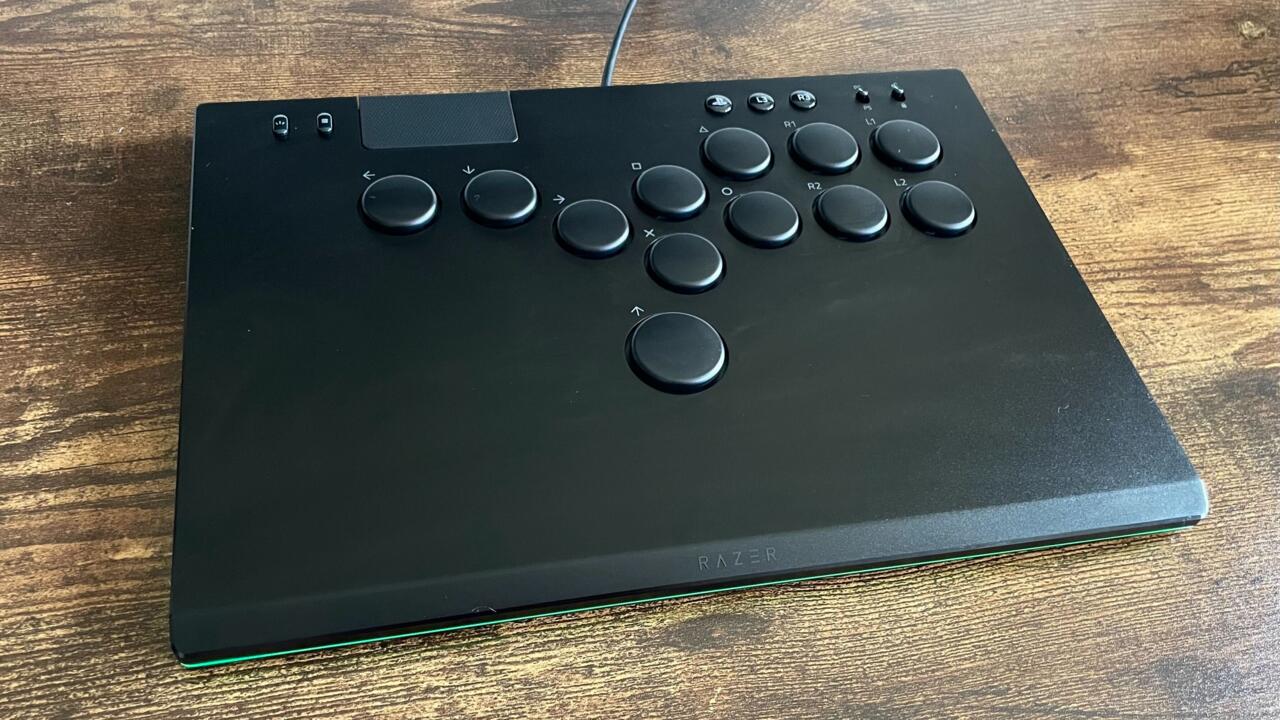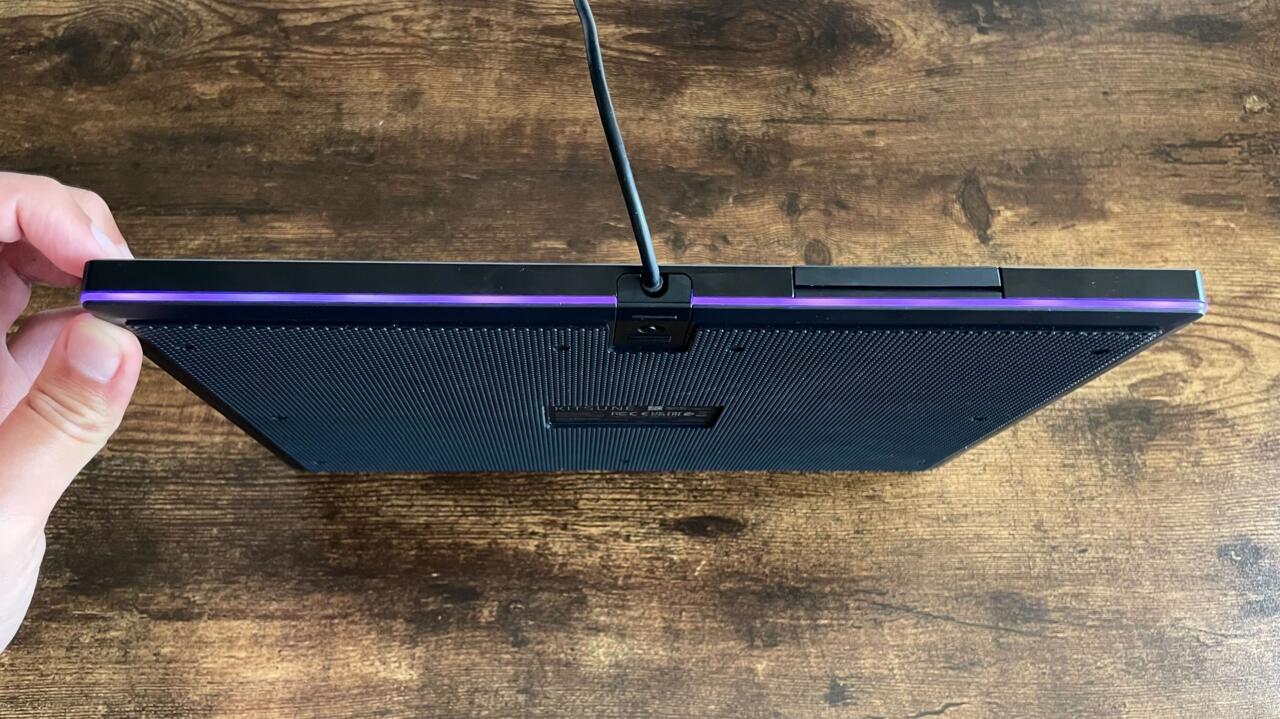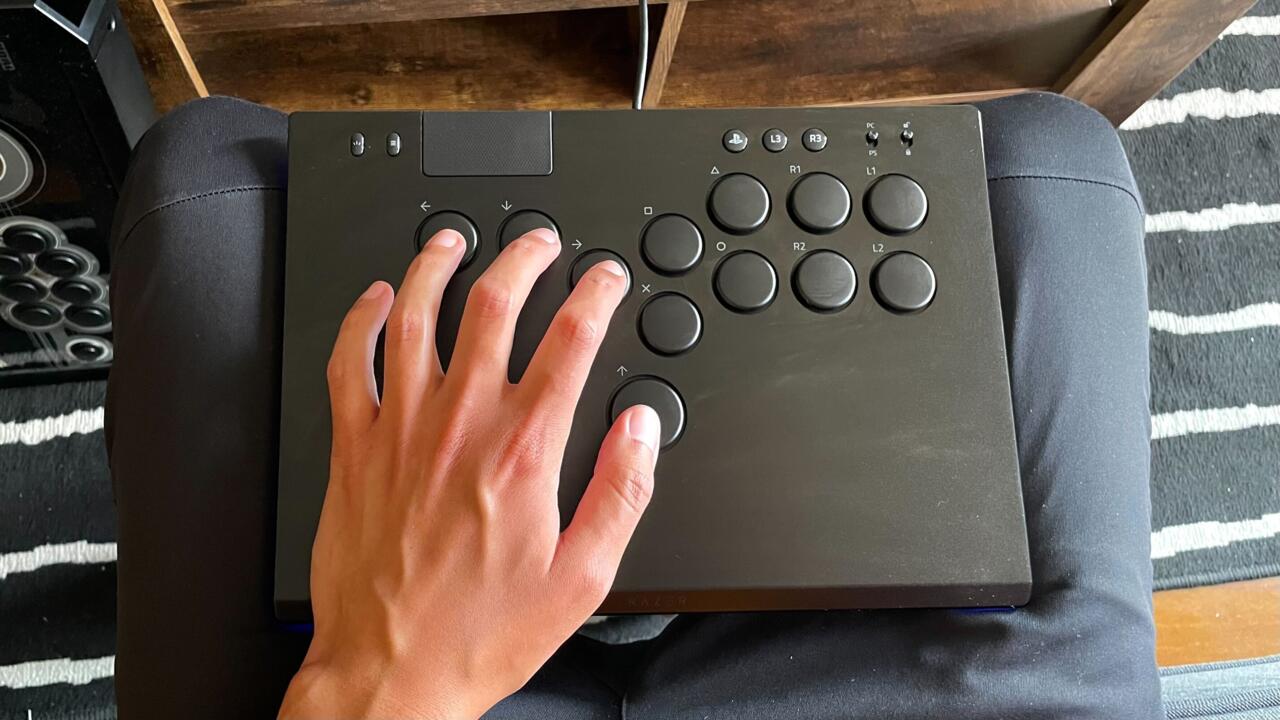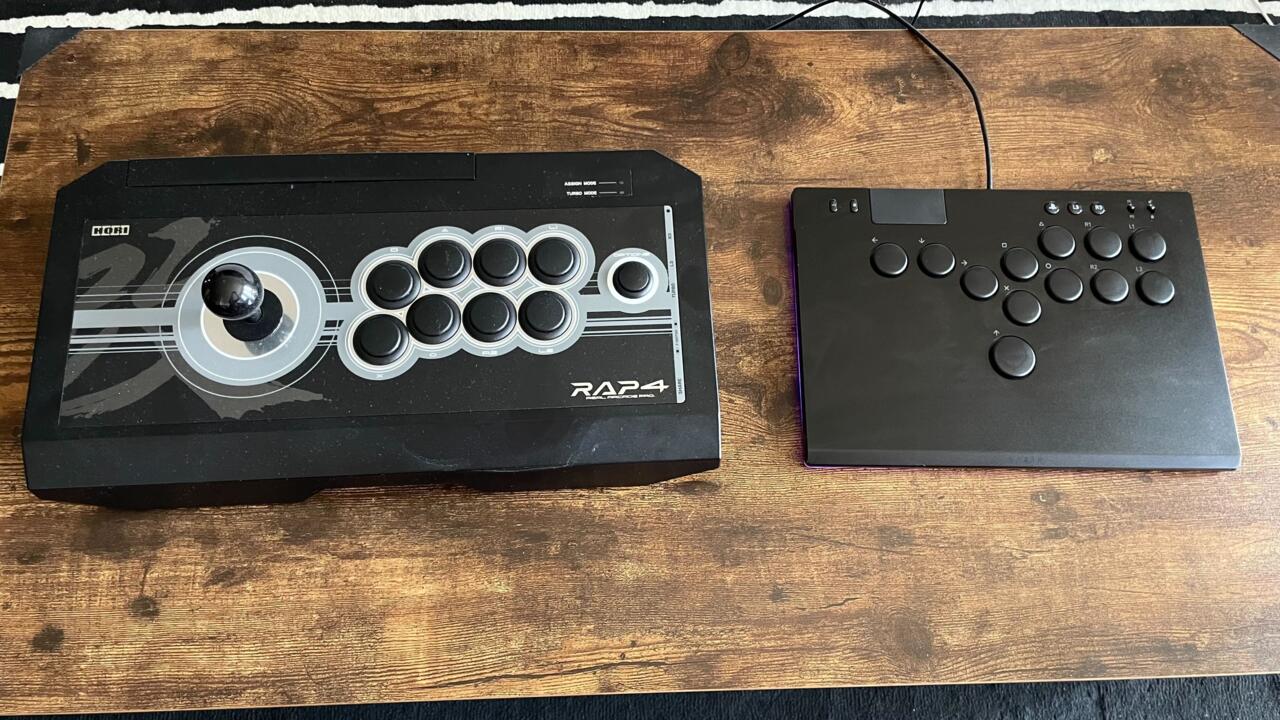Arcade-style fight sticks still dominate the competitive fighting game scene, even though as time has gone on, gamepads have been gaining ground among high-level players. However, leverless all-button fight “sticks”–commonly referred to as Hit Boxes, which is the company that popularized them–have gained a lot of traction. By relegating movement to four distinct buttons, directional inputs are quicker and more precise, and there’s an ergonomic advantage to the keyboard-like hand placement when using one. These kinds of controllers are still relatively tough to find with very few on the market, but Razer has entered the scene with the Kitsune and nearly perfected the art in its first round.
The Razer Kitsune is the company’s take on the Hit Box-style fighting game controller, using the familiar layout with left, down, and right buttons in-line with your ring, middle, and index finger, respectively. This makes quarter-circles as easy as a swift two-button press, for example. Up/jump is set to the thumb button like the spacebar on a keyboard, and the rest of the buttons are laid out the same as you’d see on a traditional fight stick. But it’s the little things that make the Razer Kitsune exceptional like the slim form factor, ideal dimensions, and most importantly, the mechanical switches for the buttons.
Let’s start with the mechanical switches, because this is the feature that impacts performance the most. Razer has taken its expertise in making mechanical switches for its own gaming keyboards and implemented the same technology for the Kitsune, which uses the low-profile optical linear-style switches with a short throw distance and actuation point (1.2 mm), helping you dish out inputs super fast. If you’ve used Cherry MX Reds or Razer’s proprietary Yellow switches on a keyboard, the buttons on the Kitsune will feel familiar as they share the smooth and responsive press.

There’s a similar “thock” to pressing buttons on a mechanical keyboard as opposed to the plastic-y click of buttons on an arcade cabinet. This differs quite drastically from the Sanwa pushbuttons, for example, commonly found on traditional high-end arcade sticks, which might leave purists skeptical. But for me, bringing the best of gaming keyboards to a fighting game controller is a wonderful match. Optical mechanical switches are fast on the draw and as responsive as you can ask, and they’re so satisfying to mash on.
Using keyboard-like mechanical switches is also how Razer is able to achieve such a slim profile, which is important because the other distinguishing feature of the Razer Kitsune is how the unit is actually built. It’s as thin as a 13″ MacBook and just wide enough to sit on my lap comfortably. And the chassis has enough surface area to offer palm rests. (The full dimensions are 296 mm / 11.66″ length, 210 mm / 8.27″ width, 19.2 mm / 0.75″ height) It’s also lightweight at around 1.76 lbs / 800 g, so carrying the Kitsune around is easy. In addition to the leverless design, which means a joystick isn’t protruding out, the ultra-slim form factor and negligible weight makes taking this thing to locals, meetups, or tournaments as effortless as bringing a notebook.
Just because it’s light and compact doesn’t mean it’s flimsy. The solid aluminum chassis gives the Kitsune some density and durability, and although the material leaves noticeable smudges and fingerprints, it’s anything but cheaply built. The packaging includes some vinyl skins to add a bit of visual flair, and these can mitigate the visible smears–and the top plate is removable to swap out or for DIY designs, which is as far as customization goes. You’ll also get a long, 10-foot USB-C to USB-A cable, and the Kitsune has a locking latch to secure the cord in place so it doesn’t get disconnected by accident. It being a Razer product, you can bet on Chroma RGB lighting–but the Kitsune is low-key about it with the RGB strip around the base, which adds a nice touch. Lastly, the rubber padding on the bottom lets the Kitsune grip surfaces and stick to your lap so it doesn’t slide around during intense fights.

It’s worth noting that this is specifically for PC and PS5 (and officially licensed by PlayStation, and tournament legal), and it includes the PlayStation touchpad on the top-left corner along with the Share, Options, Home, and L3/R3 buttons across the top. If you do want to use this on Xbox, there are adapters for it to be recognized by the platform if you set the Kitsune to PC mode. Unfortunately, there is no native PS4 support, which is disappointing considering the official license and wide usage of the PS4 in the fighting game scene.
Admittedly, leverless all-button controllers take a lot of getting used to, and much more time to master. Even after pouring roughly 20 hours of online matches into my favorite fighting games, only now is it starting to feel natural. However, those efforts are nothing compared to the time I’ll be playing fighting games using the Kitsune now and in the future, because once I got attuned to the layout, there was no turning back.
Melty Blood: Type Lumina is my current main fighting game, and it’s a super-fast 2D anime fighter. While it’s not as execution-heavy as other fighting games, its speed makes quickly pulling off quarter circles, DPs, and jump cancels crucial. As a former arcade stick user, Melty Blood was a bit exhausting, and as matches went on, I’d notice myself getting a bit sloppy with inputs. Call it a skill issue, but using a leverless controller highlighted the need for speed. The advantage of tapping directions for certain moves and timing for specific combos changed how I played the game. For example, using a DP out of a block-string was off the table with a regular stick, but the swiftness and timing required for these inputs are now possible for me and opens up options like this in the heat of the moment.
I mostly play as Kimberly in Street Fighter 6, and using her full kit is much easier with the all-button layout. Especially with the frequent down-down inputs to drop her spray cans, double-tapping the down button on the Kitsune lets me pull these off significantly faster and with much less effort, for example. And while executing on follow-up with her rushdown capabilities took a ton of practice, any mistakes fell entirely on me rather than wondering if my stick’s directional inputs were off.
Guilty Gear Strive is probably the fighting game in my current rotation that requires the heaviest level of execution. As a Ramlethal main, the constant quarter-circles mid-combo are much simpler to pull off, of course. But it’s the half-circle-forward special move that’s now a breeze to execute. After spending some time in the lab, I came out more nimble in Strive, which is something I hadn’t felt before considering how weighty the game feels.

My experiences across all three fighting games speaks to the advantage that leverless all-button fighting game controllers offer. But it’s the premium experience offered by the Razer Kitsune that brings it all together. Yes, the layout lets me naturally execute moves without error, but the mechanical switches means these inputs are accurate and fast, while being easy on my hands and having that satisfying feedback with each button press. I don’t even have to think about having to pack it because of the slim and easily portable form. It’s the confluence of ergonomics, button-feel, and physical design that elevates it beyond being another leverless controller.
This thing certainly does not feel cheap, because it isn’t. At $300 USD, you really do get what you pay for, but that’s a high asking price regardless. However, this is roughly around the price of its competitors’ high-end offerings. It’s not unheard of to drop around that much for a top-quality fight stick, leverless or otherwise. You can get a Hit Box for around $200, but you won’t get the slim form factor or the satisfying mechanical switches. I was so close to investing in Junk Food’s Snack Box Micro, which is an extra-small custom-made leverless controller, but they come out in limited quantities and are too small to use on my lap–which is often the case when I play fighting games.
Razer, known for its range of extravagant PC gaming accessories, has entered the scene already at the top of the game by sensibly adapting its designs from keyboards to a fighting game controller. Although you’ll be paying a premium price, you get a premium product–and with leverless all-button controllers being somewhat tough to find, having more (and high-quality) options is certainly a good thing.

Finding the right controller for fighting games comes down to preference, and some folks will always use a gamepad or arcade stick whether it be for comfort or muscle memory. For me, the Razer Kitsune comes in as the perfect answer to my search for a Hit Box-style controller, checking every box when it comes to what I need and want out of one. It’s pretty wild to think, after all these years of playing fighting games, investing in the right stick, and tinkering with them, that I won’t be using them anymore. It’s about time I retire my trusty Hori RAP4 fight stick after about six years, but I didn’t expect to go all-in on leverless.
Overall, the Razer Kitsune is the best fighting game controller I’ve ever used. The learning curve is quite steep, but the payoff is well worth the effort. The lack of native PS4 support is disappointing, which would be a dealbreaker for some. But from its build quality and physical design to the ergonomics and actual performance in competitive scenarios, it’s nearly impossible for me to find a notable flaw in my 20-plus hours using it. And I anticipate that to be the case in the countless hours ahead, because this is the fighting game controller I’ll be using for the foreseeable future.
Editor’s note: A correction was made regarding PS4 compatibility and the text has been updated to reflect that.
The products discussed here were independently chosen by our editors.
GameSpot may get a share of the revenue if you buy anything featured on our site.

